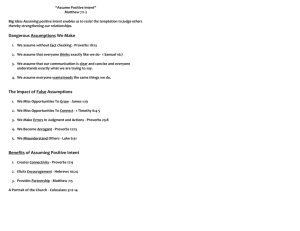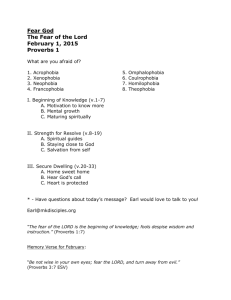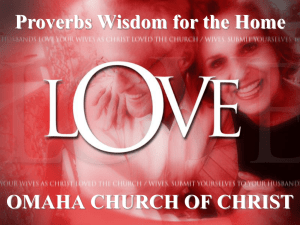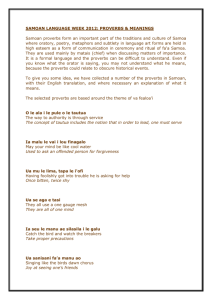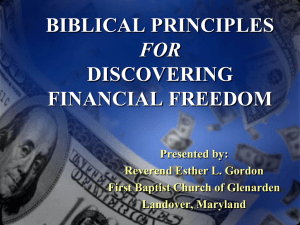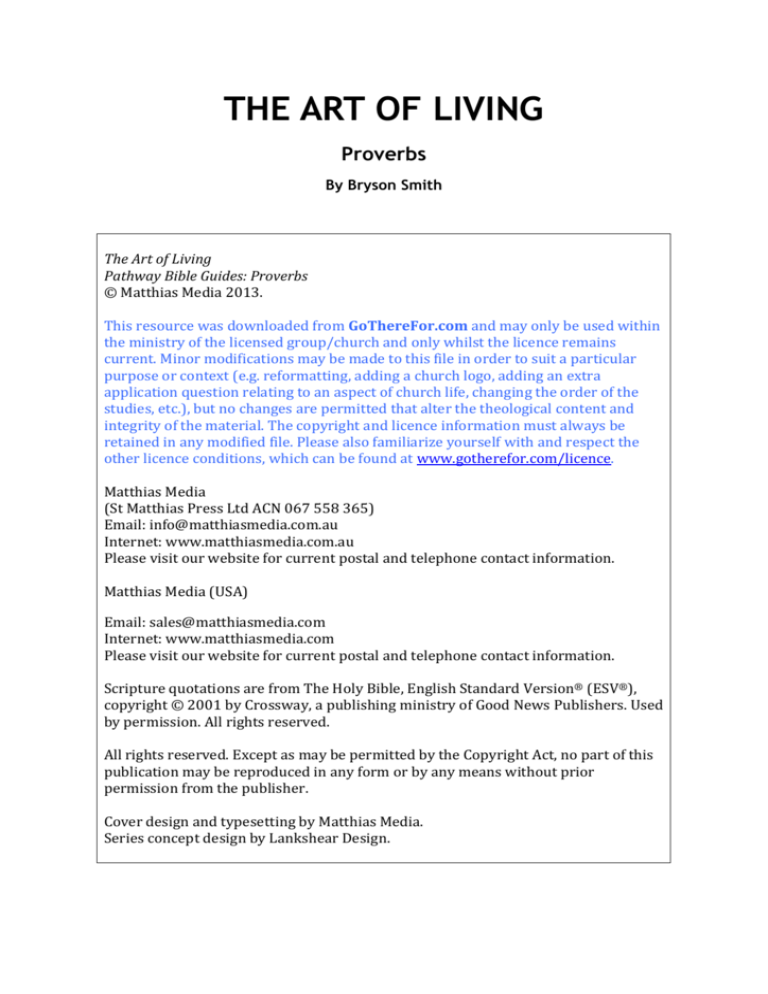
THE ART OF LIVING
Proverbs
By Bryson Smith
The Art of Living
Pathway Bible Guides: Proverbs
© Matthias Media 2013.
This resource was downloaded from GoThereFor.com and may only be used within
the ministry of the licensed group/church and only whilst the licence remains
current. Minor modifications may be made to this file in order to suit a particular
purpose or context (e.g. reformatting, adding a church logo, adding an extra
application question relating to an aspect of church life, changing the order of the
studies, etc.), but no changes are permitted that alter the theological content and
integrity of the material. The copyright and licence information must always be
retained in any modified file. Please also familiarize yourself with and respect the
other licence conditions, which can be found at www.gotherefor.com/licence.
Matthias Media
(St Matthias Press Ltd ACN 067 558 365)
Email: info@matthiasmedia.com.au
Internet: www.matthiasmedia.com.au
Please visit our website for current postal and telephone contact information.
Matthias Media (USA)
Email: sales@matthiasmedia.com
Internet: www.matthiasmedia.com
Please visit our website for current postal and telephone contact information.
Scripture quotations are from The Holy Bible, English Standard Version® (ESV®),
copyright © 2001 by Crossway, a publishing ministry of Good News Publishers. Used
by permission. All rights reserved.
All rights reserved. Except as may be permitted by the Copyright Act, no part of this
publication may be reproduced in any form or by any means without prior
permission from the publisher.
Cover design and typesetting by Matthias Media.
Series concept design by Lankshear Design.
PROVERBS PATHWAY BIBLE GUIDES
Contents
Before you begin
1: The gaining of wisdom (Proverbs 1:1-6)
2: The beginning of wisdom (Proverbs 1:7)
3: The voice of wisdom (Proverbs 9)
4: The opposite of wisdom (Proverbs 1-8)
5: The patterns of wisdom (Proverbs 16)
6: The lessons of wisdom (Proverbs 10-29)
7: The search for wisdom (Proverbs 30)
8: Lady wisdom (Proverbs 31:10-31)
Before you begin
“How should I live my life?” This is a pertinent question not just for Christians but for
non-Christians too, judging by the shelves and shelves of self-help books you see in your
local bookstore, and the letters pages of certain magazines. There are people wanting
advice about all sorts of things, like “Which job should I take?”, “What should I say to my
friend whose mother died recently?”, “What’s the best thing to do in this situation?”, and
so on. The answers come not just from self-help books and magazine columns, but from
a variety of sources: your family, your friends, your colleagues, your minister and other
people you respect. Some of it is common knowledge; some of it is folk wisdom. As the
old sayings go, “Too many cooks spoil the broth”, “A bird in the hand is worth two in the
bush” and “Don’t count your chickens before they hatch”.
However, when it comes to the art of living, the book of Proverbs is really the best
authority on how to live, because its wisdom is no less than the wisdom of God—the God
who created it all and knows it all. Indeed, the most important lesson on wisdom that
Proverbs has to teach can be found in the very first chapter: “The fear of the LORD is the
beginning of knowledge” (Prov 1:7).
Proverbs is filled with rich instruction on how to live—how to spend our money, how
to work, what to say (and how to say it) and a whole host of other topics. Because of who
God is, certain types of behaviour are good and certain types of behaviour are bad.
Because of the way he established the world, we can observe certain patterns about the
way it works, reflect on them and then act accordingly. Proverbs offers instruction that
will enable us to live stable, good, coherent and effective lives.
But Proverbs also acknowledges that there will always be a voice—the voice of
folly—competing for our attention and seeking to lead us astray. The voice of folly
comes in many disguises—some of which may not be immediately obvious to us.
We must learn to recognize it and reject it for what it is, for the result of heeding it is
always death and destruction.
That the message of Proverbs is an unpopular one in our society should be no surprise,
for its message ultimately concerns the Lord Jesus Christ. In fearing the Lord, we are not
just to fear any old god but the one “in whom are hidden all the treasures of wisdom and
© Matthias Media. For use only while the GoThereFor.com licence is current.
2
PROVERBS PATHWAY BIBLE GUIDES
knowledge” (Col 2:3). Jesus, as God’s king, has been endowed with all wisdom and
understanding, which makes him the pre-eminent authority on wisdom—the only truly
wise man. In fearing him, we come to understand the real purpose of life, and therefore
the real goal of wisdom.
In these studies, we’ll examine what the book of Proverbs means by ‘wisdom’ and
how that wisdom applies to our lives. It is my prayer that as you discover wisdom’s
immeasurable value, you’ll hold it near and dear, and let it shape your life. To possess
wisdom is to understand the true art of living.
Bryson Smith
October 2007
© Matthias Media. For use only while the GoThereFor.com licence is current.
3
PROVERBS PATHWAY BIBLE GUIDES
1. THE GAINING OF WISDOM
Proverbs 1:1-6
Getting started
What are some examples of good advice you have received from others? What made
their advice so helpful?
Light from the Word
Read Proverbs 1:1-6.
1. According to verses 2-5, what is the purpose of the book of Proverbs?
2. Verses 2-5 mention lots of things. What do you think is meant by the following?
wisdom
prudence
discretion
3. Do you think the things mentioned in verses 2-5 are popular or unpopular in
today’s world? Why?
4. Which of the things listed in question 2 would you like to have more of? Why?
© Matthias Media. For use only while the GoThereFor.com licence is current.
4
PROVERBS PATHWAY BIBLE GUIDES
5. Verse 6 alerts us to the fact that the book of Proverbs is going to contain a range
of different types of expressions of wisdom (e.g. proverbs, sayings and riddles).
How would you define each one?
proverb
saying (this is translated as ‘parable’ in the NIV)
riddle
6. Who wrote this book, according to verse 1?
Read 1 Kings 4:29-34.
7. Why is Solomon a good person to learn about life from?
The connection between Solomon and wisdom is the start of an ongoing association in
the Old Testament between wisdom and God’s king. Read Isaiah 11:1-3.
8. These verses describe God’s future king (i.e. Messiah or Christ)—the one who
will rule Israel. What characteristics of this future king are similar to those in
Proverbs 1:2-5?
The connection between wisdom and God’s king reaches its most profound moment
with the coming of Jesus Christ. Read Matthew 12:38-42.
© Matthias Media. For use only while the GoThereFor.com licence is current.
5
PROVERBS PATHWAY BIBLE GUIDES
9. If Jesus is even wiser than Solomon, how should we respond to what Jesus says?
To finish
Are there certain things about following Jesus which don’t make sense to the world, and
which seem a bit silly to do? How does this study strengthen our trust in what Jesus
says?
Give thanks and pray
Thank God for the wonderful wisdom of our Lord Jesus. Ask him to give you the wisdom
to be obedient to him.
© Matthias Media. For use only while the GoThereFor.com licence is current.
6
PROVERBS PATHWAY BIBLE GUIDES
2. THE BEGINNING OF WISDOM
Proverbs 1:7
Getting started
Is it possible to be too flippant or too casual in the way we treat God? How would such
an attitude show itself?
Light from the Word
Read Proverbs 1:7.
1. What do you think it means to have the “fear of the LORD”?
2. Is the “fear of the LORD” different to being frightened of the Lord? How?
3. What is there about God to be fearful of?
4. What do you think the phrase “the beginning of knowledge” means?
5. Try to write out verse 7 in your own words.
6. Look up the following references as well: Proverbs 2:5, 3:7, 8:13, 9:10, 14:27,
15:16, 15:33, 16:6, 19:23, 22:4, 23:17, 24:21. (To save time, you might like to
divide these verses between individuals, or groups of two or three, and have
© Matthias Media. For use only while the GoThereFor.com licence is current.
7
PROVERBS PATHWAY BIBLE GUIDES
people report back to the group what they have discovered.) List some of the
consequences of having the “fear of the LORD”.
7. It’s important to note that when Proverbs urges us to fear the Lord, it’s always in
small capitals: ‘LORD’. Whenever ‘LORD’ appears in small capitals in our Bibles, it
stands for Yahweh, the personal name of the God of Israel—the God who
revealed himself as Yahweh to Moses at the burning bush (Exod 3). In other
words, when Proverbs tells us to fear God, it’s not the fear of any old god you
might happen to believe in; it’s the fear of Yahweh, the God of Israel. This fear of
Yahweh is the beginning of wisdom. How is this lesson different to what the
world tells us?
Read Psalm 2.
8. In this psalm, people are to fear not just the Lord, but his Son and chosen king.
Why?
9. Describe the lifestyle of someone who lives in fear of God’s Son, Jesus Christ. Try
and be as specific as you can.
To finish
What are some of the ways in which you are tempted to ‘fear’ things and people other
than Jesus Christ?
Give thanks and pray
Ask God to fill you with a reverent fear of him and his Son.
© Matthias Media. For use only while the GoThereFor.com licence is current.
8
PROVERBS PATHWAY BIBLE GUIDES
3. THE VOICE OF WISDOM
Proverbs 9
Getting started
Who out of the following list of people do you think would give the most reliable advice?
Why?
politicians
teachers
friends
family members
talk show hosts
work colleagues
doctors
shop assistants
It may seem a little strange to jump ahead to chapter 9, but this chapter gives us a good
summary of 1:8-9:18. In our next study, we’ll go back and look at some of the lessons
from the earlier chapters.
Light from the Word
Read Proverbs 9:1-12.
1. What image is used to describe Wisdom in verses 1-3?
2. What invitation does Wisdom give in verses 4-6?
3. What main piece of advice does Wisdom offer about life in verse 10?
4. What are the consequences of following Wisdom (vv. 6, 11)?
© Matthias Media. For use only while the GoThereFor.com licence is current.
9
PROVERBS PATHWAY BIBLE GUIDES
Read Proverbs 9:13-18.
5. What image is used to describe Folly in verses 13-15? How is this image both
similar and different to the one used for Wisdom?
6. What invitation does Folly give in verse 16?
7. What main piece of advice does Folly offer about life in verse 17? How does this
advice reflect a failure to fear the Lord?
8. What are the consequences of following Folly (v. 18)? How do these
consequences contrast with what Folly actually offers?
9. If you are feeling particularly creative, try drawing Wisdom and Folly as
described in Proverbs 9.
Read Matthew 4:1-11.
10. We have seen that Folly (i.e. not living in the fear of the Lord) will eventually lead
to destruction, even though it tempts us with sweet rewards. How is Jesus a good
example of how to deal with the temptation of foolish living?
To finish
Folly often tempts us with short-term worldly gains and experiences at the expense of
long-term spiritual blessings. What are some ways that we can keep our focus as
Christians?
Give thanks and pray
Ask God for the insight and strength to recognize and resist the voice of Folly.
© Matthias Media. For use only while the GoThereFor.com licence is current.
10
PROVERBS PATHWAY BIBLE GUIDES
4. THE OPPOSITE OF WISDOM
Proverbs 1-8
Getting started
When do you find it hardest to live in the fear of the Lord?
Light from the Word
In our last study on Proverbs 9, we discovered that folly (i.e. not living in the fear of the
Lord) will eventually lead to destruction, even though it tantalizes us with the prospect
of sweet rewards. In this study, we will go back to some of the earlier chapters to think
about some of the disguises that folly can try and tempt us with.
The voice of the sinner
Read Proverbs 1:10-19.
1. What is tempting about the voice of the sinner?
2. What are the consequences of behaving this way?
3. Are there particular areas of your life where you are tempted by the voice of the
sinner? If so, how?
The voice of the adulteress
Read Proverbs 5.
4. What is tempting about the voice of the adulteress?
© Matthias Media. For use only while the GoThereFor.com licence is current.
11
PROVERBS PATHWAY BIBLE GUIDES
5. What are the consequences of behaving this way?
6. Are there particular areas of your life where you are tempted by the voice of the
adulteress? If so, how?
The voice of the sluggard
Read Proverbs 6:6-11.
7. What is tempting about the voice of the sluggard?
8. What are the consequences of behaving this way?
9. Are there particular areas of your life where you are tempted by the voice of the
sluggard? If so, how?
To finish
What are some other ‘voices’ or examples of how Folly is seeking to tempt you in your
life? What are some practical ways that we can help each other to resist her?
Give thanks and pray
Look back at the ‘Give thanks and pray’ from the last study. Use it again as the basis for
prayer, but this time try to be specific about the areas of your life in which Folly is
presently tempting you.
© Matthias Media. For use only while the GoThereFor.com licence is current.
12
PROVERBS PATHWAY BIBLE GUIDES
5. THE PATTERNS OF WISDOM
Proverbs 16
Getting started
“There is no rhyme or reason to life. It’s all just chaos and chance!” What would you say
in response to this?
Light from the Word
In this study, Proverbs 16 is treated as a representative chapter of the entire section of
chapters 10-29. Read Proverbs 16.
1. What is your overall impression of this chapter?
2. List the sorts of topics and subjects which are covered by these verses.
3. Is there any order or pattern to the way the topics are arranged?
4. Are there any verses which you find especially helpful or surprising? Why?
5. Many of the sayings in Proverbs stem from what the Lord is like—what he
approves of, hates, commends, and so on. These sayings make a value judgement
about what is the morally right or wrong way to live, based on who God is and his
righteousness. What verses in chapter 16 (if any) lay down obligations about how
we must live if we are to live in the fear of the Lord?
6. Many of the sayings in Proverbs are based on careful observations of what
happens in life. These observations describe the way things usually happen in
God’s world without always making a value judgement on how right or wrong
© Matthias Media. For use only while the GoThereFor.com licence is current.
13
PROVERBS PATHWAY BIBLE GUIDES
these regularities are. What verses in chapter 16 (if any) describe the way things
usually happen without making any real value judgement?
7. It can be difficult sometimes to know whether a saying in Proverbs is a statement
about what is always right and wrong (which we should therefore obey), or
whether it is a wise observation about the way things usually go in our world
(which we should therefore apply more carefully, depending on our
circumstances). Some people find this a little disconcerting. However, it’s helpful
to remember that Proverbs wants us to think carefully about its sayings so that
we might live wisely and well in the world as people who fear the Lord (Prov 1:46).
8. Are there any verses in Proverbs 16 where it’s difficult to decide whether they
are ‘obligations’ or ‘observations’?
9. The many obligations and observations of life found in Proverbs 10-29 reflect the
fact that this world is not completely chaotic. There are regularities and patterns
in life. How does knowing Jesus help us to understand the pattern and purpose of
this world even more (cf. Eph 1:9-10; Col 1:15-20, 2:2-3)?
To finish
When is it hardest to believe that life has a pattern and order to it? How is Proverbs
helpful for us during those times?
Give thanks and pray
Thank God for creating this world with order and regularity.
© Matthias Media. For use only while the GoThereFor.com licence is current.
14
PROVERBS PATHWAY BIBLE GUIDES
6. THE LESSONS OF WISDOM
Proverbs 10-29
Getting started
What are some examples of modern-day proverbs which, in your opinion, give some
helpful insights into life (e.g. “Haste makes waste”)?
Light from the Word
In our last study, we discovered that the large middle section of Proverbs (chapters 1029) provide us with many insights about how best to live this life. In this study, we will
dip into these chapters to see what wisdom they offer on three important areas of life:
wealth, words and work.
(To save time, you might like to divide into three smaller groups, take one topic each,
and then report back at the end.)
Wealth
1. Read the following proverbs. What do you discover about how we should earn
money?
Proverbs 12:11
Proverbs 13:11
Proverbs 28:20-22
2. Read the following proverbs. What do you discover about how we should use our
money?
Proverbs 11:24-26
© Matthias Media. For use only while the GoThereFor.com licence is current.
15
PROVERBS PATHWAY BIBLE GUIDES
Proverbs 19:17
Proverbs 22:9
3. Read the following proverbs. What do you discover about how we should think
about money?
Proverbs 11:4, 18, 28
Proverbs 16:8, 16
Proverbs 23:4-5
Words
4. Read the following proverbs. What do you discover about the importance of our
words?
Proverbs 11:9
Proverbs 12:18
Proverbs 15:4
5. Read the following proverbs. What do you discover about the way we should
speak?
© Matthias Media. For use only while the GoThereFor.com licence is current.
16
PROVERBS PATHWAY BIBLE GUIDES
Proverbs 10:19
Proverbs 15:1-2
Proverbs 16:23-24
6. Read the following proverbs. What do you discover about the way we shouldn’t
speak?
Proverbs 16:28
Proverbs 17:4, 9
Proverbs 26:28
Work
7. Read the following proverbs. What do you discover about the dangers of laziness?
Proverbs 14:23
Proverbs 19:15
Proverbs 20:4, 13
© Matthias Media. For use only while the GoThereFor.com licence is current.
17
PROVERBS PATHWAY BIBLE GUIDES
8. Read the following proverbs. What do you discover about the benefits of hard
work?
Proverbs 10:5
Proverbs 20:13
Proverbs 27:18, 23-27
9. Read the following proverbs. What do you discover about the manner in which
we should work?
Proverbs 10:9, 16
Proverbs 11:1, 18
Proverbs 15:27
To finish
Ho does knowing Jesus and following him as our king reinforce the lessons we have
learned in this study?
Give thanks and pray
Thank God for giving us his wisdom which shows us how we should live. Ask him to give
you strength to live a life full of integrity, wisdom and diligence.
© Matthias Media. For use only while the GoThereFor.com licence is current.
18
PROVERBS PATHWAY BIBLE GUIDES
7. THE SEARCH FOR WISDOM
Proverbs 30
Getting started
Do you think that Christians are wiser than other people?
Light from the Word
Read Proverbs 30:1-4.
1. In this section, we meet a man searching for wisdom in life. What is his name and
how does he describe himself?
2. Possibly the best translation of verse 1 is the one mentioned in the footnotes of
the ESV (and NIV). In other words, Agur is “of Massa”, an Ishmaelite clan (cf. Gen
25:14). How does this make sense of verse 3? (Hint: look at what the Apostle Paul
says about the predicament of Gentiles in Ephesians 2:11-12.)
3. In his search for wisdom, Agur calls out for help from a competent teacher. What
characteristics does he think this teacher should have (v. 4)?
4. Who would qualify to be Agur’s teacher?
Read Proverbs 30:5-9.
5. How does Agur describe the word of God?
© Matthias Media. For use only while the GoThereFor.com licence is current.
19
PROVERBS PATHWAY BIBLE GUIDES
6. Interestingly, verse 5 is a quote from Psalm 18:30, and verse 6 is a very strong
echo of Deuteronomy 4:2. What does this show us about where Agur found
answers to his search for wisdom?
7. From what you have discovered about Agur, do you think that he has the “fear of
the LORD” (Prov 1:7)? What makes you think this?
Read Proverbs 30:7-33.
8. In the remainder of the chapter, Agur offers different insights he has gained from
having come to see that the word of God proves true. In general terms, what sorts
of topics does Agur cover? (Some of these sayings can seem a little obscure so
don’t worry too much if you can’t follow absolutely everything that’s said; you’re
in good company.)
9. What lessons (if any) are repeated from earlier chapters of Proverbs?
To finish
Proverbs 30 provides us with a wonderful case study of a person who has only been able
to make sense of life by coming to know the true and living God. How has his experience
been reflected in your own life?
Give thanks and pray
Thank God for lavishing his grace upon us “in all wisdom and insight making known to
us the mystery of his will, according to his purpose, which he set forth in Christ” (Eph
1:8-9).
© Matthias Media. For use only while the GoThereFor.com licence is current.
20
PROVERBS PATHWAY BIBLE GUIDES
8. LADY WISDOM
Proverbs 31:10-31
Getting started
What do you think life would be like if you put into practice all the lessons we’ve
discovered so far in Proverbs? This final section of Proverbs is a poem written in the
form of an acrostic. Each line of these verses in Hebrew begins with the next letter of the
Hebrew alphabet: the first word of verse 10 starts with the Hebrew equivalent of ‘A’, the
first word of verse 11 starts with the Hebrew equivalent of ‘B’, and so on, all the way to
verse 31 which begins with the Hebrew equivalent of ‘Z’. This acrostic structure
highlights that these final verses are a summary of everything that has gone before
them: here at the end of the book, we quite literally have the A-Z of Proverbs. In our final
study, we’ll investigate how this vivid description of an “excellent wife” forms an
effective summary for the whole of Proverbs.
Light from the Word
Read Proverbs 31:10-31.
1. In study 1, we discovered that the book of Proverbs can help us live a wise,
righteous and prudent life (1:2-4). How does the “excellent wife” of Proverbs 31
exemplify each of these qualities?
wisdom
prudence
discretion
2. In study 2, we learned that the “fear of the LORD is the beginning of knowledge”
(1:7). How does the “excellent wife” demonstrate this?
© Matthias Media. For use only while the GoThereFor.com licence is current.
21
PROVERBS PATHWAY BIBLE GUIDES
3. In study 3, we saw wisdom described as a woman. What are the similarities
between the description of wisdom in Proverbs 9:1-12 and the description of
wisdom in Proverbs 31:10-31?
4. In study 4, we were given advice about the foolishness of the sinner, the
adulteress and the sluggard. How is the “excellent wife” the exact opposite of
each of these three types of people?
the sinner
the adulteress
the sluggard
5. In study 6, we were given life lessons about wealth, words and work. How does
the “excellent wife” exemplify those lessons? (You might need to look back over
study 6 to refresh your memory.)
6. “The description of the excellent wife has as much to say to men as it does to
women.” What do you think?
7. How does the “excellent wife” make you feel?
8. Are there any areas of life where you would like to be more like the “excellent
wife”? What can you do in order to make this happen?
© Matthias Media. For use only while the GoThereFor.com licence is current.
22
PROVERBS PATHWAY BIBLE GUIDES
9. What characteristics of the “excellent wife” do you see displayed in Jesus Christ?
To finish
Have a look back over the previous studies. Have there been any lessons which you have
found especially helpful? What made them helpful? With God’s assistance, what changes
are you going to make in your life as a result?
Give thanks and pray
Thank our heavenly Father for promising that “If any of you lacks wisdom, let him ask
God, who gives generously to all without reproach, and it will be given him” (Jas 1:5).
Feedback on this resource
We really appreciate getting feedback about our
resources—not just suggestions for how to improve
them, but also positive feedback and ways they can be
used. We especially love to hear that the resources
may have helped someone in their Christian growth.
You can send feedback to us via the ‘Feedback’ menu
in our online store, or write to us at
info@matthiasmedia.com.au.
© Matthias Media. For use only while the GoThereFor.com licence is current.
23

